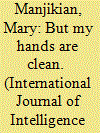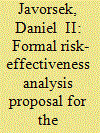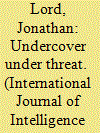|
|
|
Sort Order |
|
|
|
Items / Page
|
|
|
|
|
|
|
| Srl | Item |
| 1 |
ID:
140995


|
|
|
|
|
| Summary/Abstract |
Since the early 2000s, the Government of Japan has undertaken intensive efforts to reform its Intelligence Community (IC) in response to recent rapid changes of the national security environment surrounding Japan, such as increasing threats of terrorism, and North Korea's missile and nuclear programs, among others. The major objectives have been: (1) establishing an effective institutional mechanism connecting policymakers and the IC and (2) improving intelligence collection capabilities.
|
|
|
|
|
|
|
|
|
|
|
|
|
|
|
|
| 2 |
ID:
140993


|
|
|
|
|
| Summary/Abstract |
Post-11 September 2001 (9/11) intelligence sharing has become more important than ever. Sharing arrangements have proliferated, involving additional types of organizations on all levels (local, state, national, and international), and more participants, including those from non-democratic regimes. The fight against terror has brought many new players together for the first time, united in combat against a common enemy. But since intelligence sharing arrangements are often informal and ad hoc, clear guidelines or common ground are seldom available in determining the rules governing such arrangements in the absence of shared norms and values on issues, including human rights, accountability, and transparency. That new controversies have arisen in the area of intelligence sharing is thus not surprising. Three specific ethical dilemmas involving intelligence sharing, have developed, among others, in recent years:
|
|
|
|
|
|
|
|
|
|
|
|
|
|
|
|
| 3 |
ID:
140994


|
|
|
|
|
| Summary/Abstract |
Brazil has never been a primary target for terrorist attack by fundamentalist Islamic organizations, and bears good relations with both Arab and Islamic countries. Consequently, Islamic terrorism has not been considered an actual menace to the country. Nevertheless, the 2016 Olympics in Brazil and the rise of Islamic-oriented terrorism promoted by organizations such as the Islamic State in Iraq and al-Sham (ISIS) considerably increase the risk of a terrorist attack on Brazilian soil.
|
|
|
|
|
|
|
|
|
|
|
|
|
|
|
|
| 4 |
ID:
140996


|
|
|
|
|
| Summary/Abstract |
Information security has quietly played a significant role in the development of the contemporary U.S. hegemony in world affairs. In addition to safeguarding its most vital technological advancements, information security has preserved its tactical advantage by protecting the “ways and means” of intelligence collection and served as the foundation for U.S. military dominance.1 In part due to these efforts, U.S. weapon systems have dominated the conventional battlefield since the end of the Cold War, but recent trends indicate this margin may be shrinking. Using defense related spending as a proxy for future military dominance; a recent study suggests that by 2035, U.S. spending could be eclipsed by a resurgent China that, at 2.3 million strong, already has the world's largest active military force.2
|
|
|
|
|
|
|
|
|
|
|
|
|
|
|
|
| 5 |
ID:
140999


|
|
|
|
|
| Summary/Abstract |
I spit-shined my shoes, put on a white shirt, dark suit, and tie; I was going to a funeral. My old friend and fellow spook, Alphonse Sorrells, had died. He was still young and had retired only a year or so ago. I figured the life of a spook had done him in. Too many cigarettes, too much cheap booze from the commissary, and too many late or sleepless nights with the girls eventually got him. Many guys, seeing themselves as Hollywood spies, lived and acted that way. Certainly, Al did.
|
|
|
|
|
|
|
|
|
|
|
|
|
|
|
|
| 6 |
ID:
140990


|
|
|
|
|
| Summary/Abstract |
The Intelligence Reform and Terrorism Prevention Act of 2004 (IRTPA) created a Director of National Intelligence (DNI) and ordered him and his Office of the Director of National Intelligence (ODNI) to improve intelligence analysis in the wake of two major perceived U.S. intelligence failures: al-Qaeda's attacks of 11 September 2001 (9/11) and the National Intelligence Estimate (NIE) on Iraqi weapons of mass destruction (WMD) of September 2002.1 Observers’ initial assessments of the IRTPA were generally that the DNI and his office would be weak and have little effect on the U.S. Intelligence Community (IC) other than adding a wasteful layer of bureaucracy.
|
|
|
|
|
|
|
|
|
|
|
|
|
|
|
|
| 7 |
ID:
140998


|
|
|
|
|
| Summary/Abstract |
In the 1930s, Germany developed a close, cooperative relationship with Nationalist China, led by Chiang Kai-shek. At the time, China and Germany were tied closely by trade agreements and the presence in China of German military advisers. From the end of 1936, Germany was also politically bound with militarist Japan via the Anti-Comintern Pact. After Japan's invasion of the Chinese mainland in 1937, however, Germany faced the dilemma of maintaining friendly relations with both Japan and China in order to reap the greatest possible political benefits. But Adolf Hitler felt compelled to support Japan, and was consequently determined to withdraw the German military advisory group from China in mid-1938.
|
|
|
|
|
|
|
|
|
|
|
|
|
|
|
|
| 8 |
ID:
140991


|
|
|
|
|
| Summary/Abstract |
One of the more charming and frustrating aspects of American life is the endless pursuit of perfection. Americans tend to believe, as a people, that things can always be improved. For many aspects of life—science, medicine, transportation safety, etc.—this is a worthwhile approach. But for other aspects of life this pursuit is really a chimera, an illusory, unattainable goal. Indeed, in some areas pursuing it may be even more costly than not pursuing it.
|
|
|
|
|
|
|
|
|
|
|
|
|
|
|
|
| 9 |
ID:
140992


|
|
|
|
|
| Summary/Abstract |
Almost every human activity now creates, or is in some way informed or affected by, digital information. The methods by which commerce, communication, socialization, and learning are conducted have all been digitized. The world's second-oldest profession—espionage—is no exception. Digital information's ubiquity has had a profound and indelible impact on intelligence collection methods. The last century has witnessed both the emergence of intelligence collection disciplines rooted in technology and the impact of technological change upon the original discipline of human intelligence. A visit to Washington, DC's National Spy Museum will reveal the hundreds of devices designed and used to both support and thwart U.S. intelligence operations. While, previously, technological innovation had an incremental impact on intelligence, today's emerging digital environment has the potential to wholly transform the foundation upon which intelligence rests: secrecy.
|
|
|
|
|
|
|
|
|
|
|
|
|
|
|
|
| 10 |
ID:
140997


|
|
|
|
|
| Summary/Abstract |
Most of the literature related to Israeli intelligence on the eve of the 1973 Yom Kippur War refers to its failure, mainly because it did not provide an early warning. The flawed intelligence assessment rendered in October 1973 has been studied intensively and remains the subject of much public and professional debate. More than a decade ago, Israeli scholar Uri Bar-Joseph studied the most recently released evidence and came to the conclusion that the deficient deployment of the Israeli army, the Israel Defense Force (IDF), was the result of the absence of a sufficient intelligence warning, which was at the root of the Israeli failure at the start of the war.1 In his book, The Watchman Fell Asleep, Bar-Joseph tried to shed light on the circumstances and causes of the Yom Kippur attack by Egyptian and Syrian forces on Israeli positions at the Suez Canal and the Golan Heights on 6 October 1973. The evidence suggests that an important circumstance accounts for the surprise effect of these actions, despite ample warning signs thereof, is traceable to a significant need for cognitive closure among major figures in the Israeli intelligence establishment. Such a need may have prompted leading intelligence analysts to “freeze” on the conventional wisdom that an attack was unlikely, and to become impervious to information suggesting that it was imminent. The discussion here considers the psychological forces affecting intelligence operations in predicting the initiation of hostile enemy activities, and describes possible avenues of dealing with psychological impediments to open-mindedness that may pervasively characterize such circumstances.
|
|
|
|
|
|
|
|
|
|
|
|
|
|
|
|
|
|
|
|
|